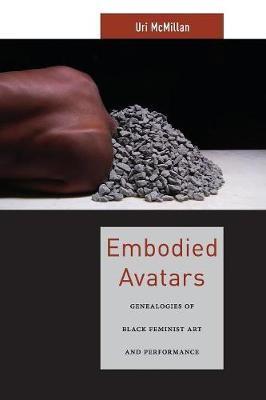20%OFF
Stock image for illustration purposes only - book cover, edition or condition may vary.
Embodied Avatars: Genealogies of Black Feminist Art and Performance (Sexual Cultures)
Uri McMillan
FREE Delivery in Ireland
Description for Embodied Avatars: Genealogies of Black Feminist Art and Performance (Sexual Cultures)
Paperback. Series: Sexual Cultures. Num Pages: 304 pages, 6 colour illustrations, 38 black & white illustrations. BIC Classification: JFFJ; JFFK; JFSL1. Category: (G) General (US: Trade). Dimension: 156 x 229 x 18. Weight in Grams: 454.
How black women have personified art,expression,identity, and freedom through performance Winner, 2016 William Sanders Scarborough Prize, presented by the Modern Language Association for an outstanding scholarly study of African American literature or culture Winner, 2016 Barnard Hewitt Award for Outstanding Research in Theatre History, presented by the American Society for Theatre Research Winner, 2016 Errol Hill Award for outstanding scholarship in African American theater, drama, and/or performance studies, presented by the American Society ... Read morefor Theatre Research Tracing a dynamic genealogy of performance from the nineteenth to the twenty-first century, Uri McMillan contends that black women artists practiced a purposeful self- objectification, transforming themselves into art objects. In doing so, these artists raised new ways to ponder the intersections of art, performance, and black female embodiment. McMillan reframes the concept of the avatar in the service of black performance art, describing black women performers' skillful manipulation of synthetic selves and adroit projection of their performances into other representational mediums. A bold rethinking of performance art, Embodied Avatars analyzes daring performances of alterity staged by ancient negress Joice Heth and fugitive slave Ellen Craft, seminal artists Adrian Piper and Howardena Pindell, and contemporary visual and music artists Simone Leigh and Nicki Minaj. Fusing performance studies with literary analysis and visual culture studies, McMillan offers astute readings of performances staged in theatrical and quotidian locales, from freak shows to the streets of 1970s New York; in literary texts, from artists' writings to slave narratives; and in visual and digital mediums, including engravings, photography, and video art. Throughout, McMillan reveals how these performers manipulated the dimensions of objecthood, black performance art, and avatars in a powerful re-scripting of their bodies while enacting artful forms of social misbehavior. The Critical Lede interview with Uri McMillan Show Less
Product Details
Place of Publication
New York, United States
Shipping Time
Usually ships in 4 to 8 working days
About Uri McMillan
Uri McMillan is Assistant Professor of English, African American Studies, and Gender Studies at the University of California, Los Angeles.
Reviews for Embodied Avatars: Genealogies of Black Feminist Art and Performance (Sexual Cultures)
Uri McMillan takes us on a journey to unexpected terrain. With powerful alchemy, he reveals how black women performance artists work on multiple registers-through seduction, trickery, the comfort of the seemingly familiar-to enact possibility, or what he theorizes as performance 'in the service of a certain type of freedom.' Meticulously researched and rigorously theorized, Embodied Avatars is a model of ... Read moreinterdisciplinary scholarship grounded in archival work and impressive textual analysis. This book is certain to forge new paths of inquiry and debate in performance, gender and sexuality studies, and black cultural studies. -Nicole R. Fleetwood,author of Troubling Vision Roll over Joseph Beuys, tell Yves Klein the news! Embodied Avatars radically disrupts prevailing histories, definitions, and genealogies of performance art by focusing on black women who, over the course of two centuries, sought to turn their degraded bodies into dissident tools of emancipation and social critique. Recognizing the first modern stage of black performativity as the auction block, Uri McMillan reveals how black women turned objectification into objecthood, enabling them to remake, disguise, remold the self into an object of resistance, an embodied nightmare to the American dream. Full of eye-popping analytical turns and thrilling theoretical high wire acts, this book is both brilliant scholarship and a performance to be reckoned with. -Robin D. G. Kelley,author of Thelonious Monk Uri McMillan's magisterial debut book engages while naming a two-century-long tradition of black women's performance art in the United States...Part of the greatness of this book is its complicated engagement with racialized, gendered, and sexualized objecthood as method, the risk-taking practices whereby the historically unfree recalculate the possibilities objecthood for smuggling in liberatory alternatives. -Theatre Journal Embodied Avatars presents a sweeping and charismatic investigation of the ways in which Black women have strategically staged versions of 'themselves' as modes of public, personal, and critical performance and as interventions in art, expression, identity, identification, and freedom. This vibrant and energetic study of art, performance, and embodiment is far-reaching, profound, lively, and engaging. -Stephanie Leigh Batiste,author of Darkening Mirrors Uri McMillan's magisterial debut book engages while naming a two-century-long tradition of black women's performance art in the United States, intervening in the problematic racialization and gendering of particular art historical traditions buttressed by the presumed absence of black women's aesthetic and political enactments. -Theatre Journal Embodied Avatars destabilizes the boundaries between art, objecthood, and survival within the last two centuries [...] Readers are left with the reverberating echoes of not only the black women artists profiled, but the resonances of their multiple avatars, becoming a fierce atonal chorus. Performing objecthood becomes a transformative human strategy in the face of searing dehumanization. Rather than arguing for another iteration of the human as a salvageable category, McMillan's innovative scholarship illuminates a complex and obstinate way of being, a being that strikingly prefers not to. -Women & Performance Show Less


